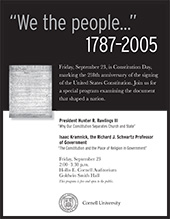Cornell to hold Constitution Day program Sept. 23

Cornell University will mark Constitution Day on Friday, Sept. 23, with a program in Goldwin Smith Hall.
Cornell President Hunter R. Rawlings and faculty member Isaac Kramnick will give a presentation on the U.S. Constitution from 2 to 3:30 p.m. in Hollis E. Cornell Auditorium. The program is free and open to the public.
The presenters will speak about the separation of church and state.
"I will review James Madison's contributions to our separation of church and state and the reasons for his adamant insistence upon this separation," Rawlings said.
Kramnick, the Richard J. Schwartz Professor of Government, will be speaking on "The Constitution and the Place of Religion in Government." "I'll also be talking in general of the attitude of the framers toward religion and government," he said.
Student volunteers will staff a table in Willard Straight Hall from 10 a.m. to 2 p.m., providing voter registration forms and handing out Constitution-related materials. Live video of the program in Goldwin Smith will be shown at the Weill Cornell Medical College campus in New York City.
All educational institutions receiving federal funds from the Department of Education are required by a law implemented in May to hold an annual educational program on the Constitution for students.
The official day is Sept. 17 - the date on which the 39 delegates to the Constitutional Convention in 1787 signed the document that was ratified as the highest law in the country and defined and separated the powers of the federal government. If the date falls on a weekend or holiday, institutions may choose a day in the preceding or following week for their programs.
Constitution Day was first proposed by U.S. Sen. Robert C. Byrd (D-W.Va.), who believes that American primary, secondary and postsecondary students lack sufficient knowledge of the Constitution. One survey by the National Constitution Center showed that more students knew the names of the Three Stooges than could name the three branches of government.
The legislation was passed in December 2004 as part of an appropriations bill. "It is itself a wonderful commentary about the document that is the Constitution, which through the principles of separation of power and checks and balances gives such authority to one legislator," Kramnick said.
A copy of the Congressional Research Service's annotated Constitution can be read at the Legal Information Institute at Cornell Law School Web site: http://straylight.law.cornell.edu/constitution/. The annotations linked in the document describe what each article and amendment means for citizens of the United States today.
Media Contact
Get Cornell news delivered right to your inbox.
Subscribe